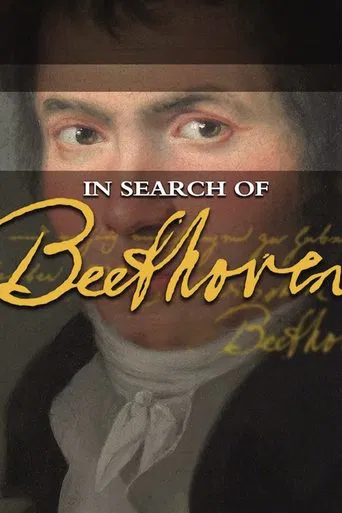

Please don't spend money on this.
... View Morenot horrible nor great
... View MoreInstead, you get a movie that's enjoyable enough, but leaves you feeling like it could have been much, much more.
... View Morewhat a terribly boring film. I'm sorry but this is absolutely not deserving of best picture and will be forgotten quickly. Entertaining and engaging cinema? No. Nothing performances with flat faces and mistaking silence for subtlety.
... View MoreIn Search of Beethoven is essentially a biography. Through studies of his music and fragments of letters written by Beethoven, the film traces the chapters of his life and his growing musical prowess.In the beginning of the film, there is an assertion that Beethoven might be the greatest composer of all time. The film sets about making its case and--no surprise--it is fairly successful. No one seriously doubts the prodigious talents of Ludwig van. Nevertheless, the film places his musical development within the historical happenings of Europe, helping the viewer to better understand the forces that were at play in his life. His life touched the lives of other great composers, Napoleon, and Goethe, for example. And these contacts helped shape his musical career.As someone who was fairly knowledgeable about Beethoven's circumstances, I still found the film entertaining. The timeline of his life helped to clarify. And the numerous performances of Beethoven's music illustrated his genius and his extraordinary creativity.The film makes the case that though Beethoven's life was tragic with regard to his health and his romantic choices, he was ever the optimist--a well-supported position that I consider a pleasing discovery.However, am I the only viewer who thought that the Ninth Symphony was represented by a somewhat weak performance (maybe because that orchestra was dedicated to performing in the style of the piece's time, without anachronisms)?Those who enjoy classical music or Beethoven's works should appreciate this film. Anyone who wants to learn about western classical music should find the film informative.
... View MoreFor anyone who has a passion for classical music,and especially for the music of Ludwig Van Beethoven,this film is for you. Director Phil Grabsky,who previously traveled down this avenue before a few years ago with the ever so fine,'In Search Of Mozart',takes us on a journey to tell the tale of a man possessed by genius (but not without a price). Over a period of (nearly)two & a half hours,we see & hear elements of Beethoven's life told by a series of historians & musicians,such as Emanuel Ax,Julliet Stevenson & Lars Vogt,who tell the tale of a gifted,but tortured soul who lost his hearing at an early age,but persevered on to compose a legacy of music that still stands today,years after his death. Grabsky,in addition to directing this film,also photographed it (images have a painterly texture to them,at times). But over all,the music speaks for itself (we get to hear excerpts from several pieces). This film is highly recommended for viewing in music classes in schools (at the film's conclusion,there is information about purchasing DVD copies,with additional footage trimmed from the final release print for the time factor,as Grabsky's original directors cut clocks in at something like fourteen hours).Spoken (mostly) in English,and German & Italian with English subtitles. Not rated by the MPAA,but contains absolutely nothing offensive,what so ever. Perfect viewing for the whole family
... View MoreIn Search of Beethoven was metaphorically a personal search for the substance of a musical genius for which I knew only superficial facts. Diane and I both thought the film was superb in allowing the viewer into this man's life and did this search primarily through his music. When the credits rolled at the end it was possible to fleetingly see all the musicians involved in demonstrating the various musical pieces that provided the bulk of this remarkable film and there were many. There were many artists and many pieces of his musical opus and from this analysis even someone untrained in music, such as me, had demonstrated for them the complexity, playfulness and virtuosity that composed this man's decades of work. Although the film was essentially musically based, my eye was drawn to another film making element that was not auditory and that was the cinematography. I am sure that I am demonstrating my own lack of knowledge about how music playing is filmed but I was continually impressed with the Big Close Ups used throughout the film. For instance, if the particular piece being played used a violin then the camera would move in and focus on only the hand or if it were a piano piece then the camera would focus only on the hand at the keyboard. I found these big close ups very gripping in their intensity and illustrative of the composition being discussed. Any person with or without knowledge of music could hugely profit from two hours spent with this musical genius.
... View MoreI saw this film at the start of last month at the Barbican London. Having been impressed the directors previous offering In Search of Mozart, I was looking forward to see what In Search of Beethoven had to offer. The film offers a great insight into the life of Beethoven taking into account social, historical and musical goings on of the time and how they shaped and influenced his life and music. The number of contributors that appear in the film is extraordinary, Ronald Brautigam, Helene Grimaud, Orchestraof the 18th Century, Endellion, Sir Roger Norrington to name a few and there must be at least over 50 pieces of music featured. Some have complained about the length of In Search of Beethoven, I would agree in some respects that it may have been a tad too long however I was engrossed in the film from start to finish. I wonder what the director Phil Grabsky will go In Search of next .
... View More